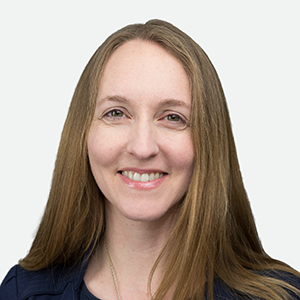
02 Jul Q&A with All of Us Research Program Deputy Director Stephanie Devaney, Ph.D.

Stephanie Devaney is the Deputy Director of the All of Us Research Program at the National Institutes of Health. Prior to this she led the coordination of the Precision Medicine Initiative from the Office of the Chief of Staff at the White House. In this role she coordinated the many components of the Initiative and guided the vision of the overall effort, along with the many federal partners. Before joining the White House, Stephane worked in the Office of the Director at the National Institutes of Health. Read her full bio.
Q&A with All of Us Research Program Deputy Director Stephanie Devaney, Ph.D.
Q1a: You are the Deputy Director of the All of Us Research Program. What is your role as the deputy director and why is this initiative so important?
A: As deputy director, my primary role is to work closely with the All of Us Director Eric Dishman in guiding the program from concept to reality. Our vision is to enable a healthier future for all of us by building a data resource that scientists can use to speed up research and the development of individualized approaches to prevention and treatment. To do this, we’ll collect different types of data from one million or more people over time. All kinds of researchers – from students to citizen scientists to established investigators – will be able to access the data for their studies. A core value of the program is partnering with participants, so we’re working with them to shape the program and to give them ways to learn about their own health. I’m proud to be a part of this extraordinary effort.
Q2a: The All of Us Research Program has opened enrollment in May of this year. What can an individual enrolling expect from this program?
A: Some participants might join through their health care provider organizations while others might sign up directly through JoinAllofUs.org or our app. Everyone who joins will go through a consent process to be sure participants are well-informed about the program before they join. If they say yes, they’ll be invited to do other activities. These could include answering surveys, giving blood and urine samples, and even sharing data from wearable devices. We’ll also ask participants to give access to their electronic health records, which are an essential component of the data we’re collecting.
The information participants choose to share will flow into the data resource that researchers can use to study many different topics in health and disease. Participants will also have access to their own information. We’ll be piloting ways to return this information to them responsibly and thoughtfully.
We also ask our participants for feedback on their experience in the program so that we can make adjustments based on input. Our program is focused on using a user-centered design approach, which means being in touch with our participants and other stakeholders, such as researchers. To take this one step further, we have opportunities for participants to engage in the planning and design of the study–already many actual participants are part of our leadership committees.
All of Us is a long journey, and we hope to collect data from participants over decades. The more information participants share, the more they may learn about themselves. Of course, participants can choose to withdraw at any time, and we will always respect their decision.
Q2b: What is the role of my primary physician in this process?
A: All of Us is working with providers from across the country to ensure that they understand the research program and are prepared to help their patients make a decision about enrolling. We will continue to engage with all types of providers as the program continues to grow. However, this is a research program and doesn’t necessarily work directly with participants’ primary physician. We do not share any information with participants’ providers or others in their lives. We are working on ways to make it easier for participants to share what they learn from All of Us with their providers, if they so choose.
Q2c: Will the generated data be part of my regular health record or held exclusively within the All of Us Research Program database?
A: (See previous response)
Q2d: How can I ensure that this data is protected and secure?
A: All of Us takes data privacy and security very seriously. Our Director, Eric Dishman, just wrote an op-ed on this very topic, as we know this is top of mind for most people as they try to make a decision about enrolling.
Any time you share information, there is a risk, but we have taken many steps to keep participants’ data safe. Here are a few of them:
-
All of Us has a Certificate of Confidentiality from the U.S. government. This helps the program fight legal demands (such as a court order) to give out information that could identify participants.
-
We use the best available security technologies and are constantly testing and monitoring our systems to find and improve any weak points.
-
Participant data is stored on protected computers. We limit and track who can access this data.
-
We remove names and other direct identifiers (like Social Security numbers) from participant records and replace them with codes. There is a master list linking codes to names. This list is kept secure, and very few people have access to it.
-
Researchers who want to access the database are required to sign an agreement stating that they will not attempt to identify any participants.
-
Participants will be notified if there is a breach that compromises their data.
You can read more about our efforts to safeguard participant data in our Privacy and Trust Principles and Data Security Policy and Framework.
Q2e: How do you ensure that all socio-economic levels, races, and ethnicities are properly represented within the test population?
A: Achieving a demographically, geographically, and medically diverse participant community is a top priority for us. That’s because data from a diverse participant community will fill gaps in our scientific knowledge and give everyone the chance to benefit from biomedical research. We’ve spent the last year building relationships from coast to coast with partners who can help us reach diverse communities. These communities include people who haven’t taken part in research—often because they’ve never been asked—or may be hesitant to. Our partners are helping us build trust in these communities and educate them about the value of research and the role of the All of Us Research Program in creating a healthier future for all of us.
Q2f: By when do we expect we will have enrolled one million participants?
A: We estimate that enrolling and collecting data from one million people will take about five to six years, but this depends on a lot of things. The scale and scope of this study and the design make it unique. We’ll be learning a lot as we go. We’re very happy with how enrollment is going so far, and we expect these numbers to continue to increase.
Q2g: By when do you expect we can start to harvest some of the learnings from this initiative?
A: The data resource is under construction now and will launch within the next year, when it has enough initial data to be useful for research. The resource will grow quickly as more participants enroll and contribute data. We expect that within just a few years, it could be used to study complex risk factors, support ancillary studies and clinical trials, and link to other large data sets.
Q2h: By when will we see a more established change and broader adoption of precision medicine in the clinic because of this initiative?
A: We can’t know for sure when outcomes from the All of Us Research Program will translate into changes in clinical care, but we’re optimistic that the program has a lot to offer in that regard.
Q2i: By when can we expect new treatments or preventions as a result of this initiative?
A: I wish we could predict medical advances, but there’s no crystal ball. We do know that for so many medical breakthroughs and precision medicine research questions, large and diverse cohorts are essential; data has been too siloed with limited access to some of our brightest minds. We will only start to answer some of the most vexing questions about human health when we start sharing more data, engage participants as partners, and open access to all sorts of researchers to work as teams on a rich data set.
Q2j: The data to be collected will be enormous. What approach will be taken to manage, understand, and share the data and findings?
A: We’re building what may be one of the largest datasets in human history and making it accessible to a broad swath of researchers, from citizen scientists to scientists with lots of experience in biomedical research in academia, the private sector, and from all parts of the globe, offering them clean, curated, rich data from a huge, diverse cohort. To get access, researchers will need to get approved (we’ll approve the researcher, not the project), abide by a code of conduct, prove their identity, take ethics training, and agree to describe all of the projects they start up once they have access to the data.
Only researchers approved by the All of Us Research Program will be allowed to see data from individual participants. Researchers who can see individual participant data will not be able to see names or other information that could identify someone directly.
We’ll maintain a public list on the All of Us website of every researcher accessing the data resource so participants can see who’s using their data and how.
Q2k: What research groups, commercial entities, and other organizations will be involved in data/knowledge extraction of this large project?
A: (See previous response)
Q3a: There are many global large scale initiatives – the UK-based 100,000 Genomics England Project, the Chinese Precision Medicine Initiative, and the France Genome Medicine Plan, just to name a few. Will there ever be an effort that combines some of those data and insights from these separate initiatives?
A: We’ve learned a lot from these efforts. We’ve been actively involved in meetings with international and domestic cohort studies. Advances in precision medicine will depend on leveraging all of them, including the data they’ve collected and the insights they’ve gathered. We believe it’s better to have more data and more collaborations and will be looking for opportunities to partner.
Q3b: What would be required to achieve this?
A: There’s so much we want to do, and creating a roadmap for these collaborative opportunities is one of them. Right now, though, we’re really focused on continuing to excite and engage potential participants about the program. The data they share will make everything else possible.
Q4: Is there anything else you would like to add?
A: Every element of the All of Us Research Program is carefully considered and evidence based. We’re currently working on developing a set of scientific priorities to help determine which kinds of data to collect and how. We’ve solicited ideas from the scientific community, participants, and the public to ensure that what we do can be useful and meaningful for researchers and, eventually, health care.






